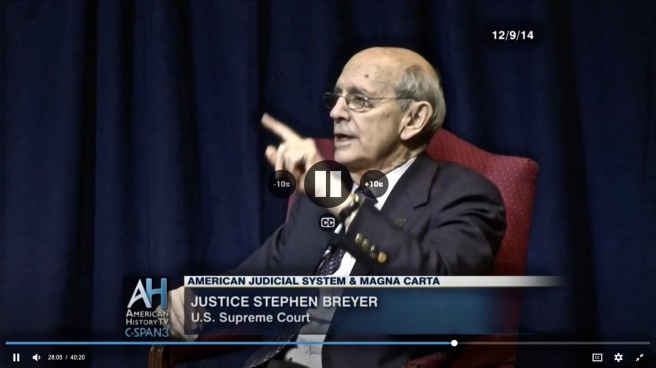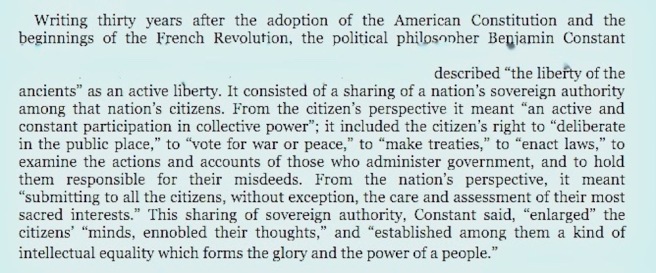
…


…
If court proceedings were streamed online — for the excellent reasons this site advocates with illustrations from a case study — the manipulation by unknown hands of search engine results about judges would be far more difficult. Of course this matters because most litigating taxpayers want — and deserve to obtain easily — information that lets them assess the likelihood that their case will be tried fairly (or not) and reassure themselves that the judge hearing it will know the law that applies (or not).
This entry in COTIN is a sequel to a part of the last one, and records a continuing void in Google where there should be facts and news about the progress of the California State Auditor’s first-ever investigation of the Commission for Judicial Performance, the disciplinary body charged with vetting allegations of misconduct against California judges. As noted earlier, a settlement in September gave the Auditor a green light to proceed after the CJP sued to block the enquiry into its handling of complaints against judges by litigants and lawyers. Unfortunately, as this post will show, discovering that vital news from internet searches has gone from unlikely to near-impossible.
Whether this has been accomplished through the efforts of actors inside or outside Google, the effect recalls the memory hole in George Orwell’s Nineteen Eighty-Four — ‘a small chute in the wall used to carry documents to a large incinerator, in order to censor information and or remnants of the past,’ which helped the Ministry of Truth ‘to serve the propaganda interests of the government.’
Obstructing the flow of facts about court officers is out of keeping with the fundamental principle in the Western legal tradition that makes court proceedings public information. It is in the reverse direction from the overarching trend in legal reform, which is to harness computer power and the internet for transparency — which would make it harder to hide judicial misconduct — and accountability, which would mean holding misbehaving or incompetent judges responsible for their actions.
Unless the distractions of Brexit act like a spanner in the works — impeding the British government’s performance of its role in the process — trials in Britain will begin to go online in 2020. Surprisingly, the United States is not at the forefront of this revolution, even if it is the home of Silicon Valley. Interviewing Justice Stephen Breyer of the U.S. Supreme Court on the occasion of the 800th anniversary of Magna Carta — to which American revolutionaries had looked for guidance about their rights — the philanthropist-billionaire David Rubenstein asked him: ‘Why not let the American people see the justices when you’re hearing cases? Why not televise them?’
Watching Justice Breyer’s struggle not to give a clear, quotable answer is a revelation. He says that members of the public watching Supreme Court deliberations will not understand that ‘the process is mostly in writing.’ On the assumption that the camera in the courtroom will be controlled by television journalists and the footage edited by them selectively, he says that he expects that any justice could be made to look ‘like a terrible idiot’. He says that permitting proceedings to be televised would involve ‘too much risk for a group of conservative people’ — though not for their successors, whom he expects to be far more comfortable with the internet as a communication medium. And then he says, finally: ‘So the answer to that is, I d o n’ t k n o w.’
Four years later, it is unlikely that he would say what he did then. Hearings of the U.K. Supreme Court, whose work is also mostly written rather than oral, have been televised since May 2011; and of all Court of Appeal deliberations, since last month. They are streamed live over the net by the court, not journalists — in an evolutionary jump that has evidently encountered no criticism — and have found a growing audience.
But it is hard to believe that even in 2014, the humane and high culture-loving Justice Breyer (the only one on SCOTUS from California) was speaking on his own behalf, about his personal beliefs — rather than, perhaps, protecting camera-averse fellow judges. Active Liberty, his book published in 2005 in which he laid out his philosophical framework for his work, can be read as a call for active participation by the public in all branches of government. In its introduction, he praises the emphasis by Benjamin Constant, an 18th-century philosopher from French-speaking Switzerland, on sharing ‘sovereign authority’ with citizens to establish ‘“among them a kind of intellectual equality which forms the glory and the power of a people.”’ This comes with ‘the citizen’s right to “deliberate in the public place,” … “to enact law,” to examine the actions and accounts of those who administer government, and to hold them responsible for their misdeeds.’
Attempts to conceal from public view the recommencement of the California State Auditor’s examination of the CJP, the institution that was set up to delve into the misdeeds of California judges, would be deeply inconsistent with ensuring the ‘active liberty’ of California citizens. Yet the first links Google supplied for ‘cjp v. california state auditor’ in September, in the week after a court-ordered settlement allowed the audit to begin — including the one highlighted here with an alert by the California Protective Parents Association to ‘get your complaints to the CA Auditor now!’ — have vanished completely from the search engine’s crucial first three pages. So has the other link featured in that COTIN post, from law.com, which also came from the first page of Google’s end-of-September results.
But those disappearances are far less serious than the burying on Google — all but out of sight — of the report on the settlement by a leading California newspaper of record, The San Francisco Chronicle. The piece ran on the day after this news emerged (eleven days before the CJP and the Auditor published their joint press release about it).
That news item would certainly have been mentioned on COTIN if it had been possible to find it using ‘CJP,’ everyone’s shorthand reference to this body, rather than ‘california commission for judicial performance v. state auditor’ — a rigid and unnatural requirement of which Google is seldom guilty. The exemplary paragraphs about the background to and consequences of the resolution of the dispute between the CJP and the Auditor beneath ‘California’s judicial disciplinary agency to be audited after complaints’ by the Chronicle’s courts reporter, Bob Egelko, were listed high on the first page of Google’s offerings in the first week of October. But they have slipped steadily in the search engine’s rankings until by yesterday, 6 November, the story had been moved to page 2, at the very bottom of Google’s list of links.
This would hardly merit notice if there were as many links to the news about the unfreezing of the Auditor as you might reasonably expect to be capable of finding on any of Google’s first three pages. There were almost none. There was a page 1 link to a Chronicle piece on the battle between the Auditor and CJP — but that was for ‘Showdown over state auditor’s access to records on probe of state judges,’ dated 17 August 2017. Several other links on that page were at least a year out of date — a most curious discovery, given that timeliness is a point of pride and a Google boast on behalf of its search engine.
Just two pages of results appeared yesterday for the search terms ‘settlement cjp v. california state auditor,’ virtually none supplying the information. The Chronicle’s report was nowhere to be found on either page. Nor was there any report by other newspapers, if ever published. The only link about the settlement was for COTIN’s post, halfway down page 1. Searchers with the patience to type in ‘settlement california commission for judicial performance v california state auditor’ would have found the Chronicle piece in the fourth position on the first Google page, with three further down pointing to COTIN, and no other report.
Similarly, for ‘cjp v. california state auditor’ — the terms employed and discussed in COTIN’s 30 September entry — there was nothing whatsoever about the settlement on Google’s first page of links yesterday. COTIN was listed in the ninth position on page 2 (photograph, above), just below the East Bay Times’s headline announcing ‘Peele: California judges trying to stop accountability move,’ which must have been shocking for readers when it ran — but that was over a year ago, on 25 August 2017.
The listing by Google of innumerable links, mostly from 2017 or earlier, for the fight between the Auditor and CJP — several of these from the Chronicle — shows that there is no lack of interest in either the subject or the newspaper. It is, to restate the obvious, that someone does not want members of the public with a legitimate complaint about the CJP and, or, California judges, to find the news about the unblocking of the audit. [ All the Google search pages mentioned here have been saved and are obtainable with a note to portia9@tutanota.com. ]
‘The United States is a nation built upon principles of liberty,’ says Justice Breyer in Active Liberty — going on to cite the Founders’ invocation of ‘the freedom of the individual citizen … to share with others the right to make or control the nation’s public acts.’
All good and true, no doubt. But surely to do any of that they need — first — reliable, fully current information protected from being shoved down that dangerous Orwellian memory hole?
One thought on “Who or what is making it harder to find news about performance-vetting and disciplining of California judges in Google — and why might this dismay Justice Breyer of the US Supreme Court?”